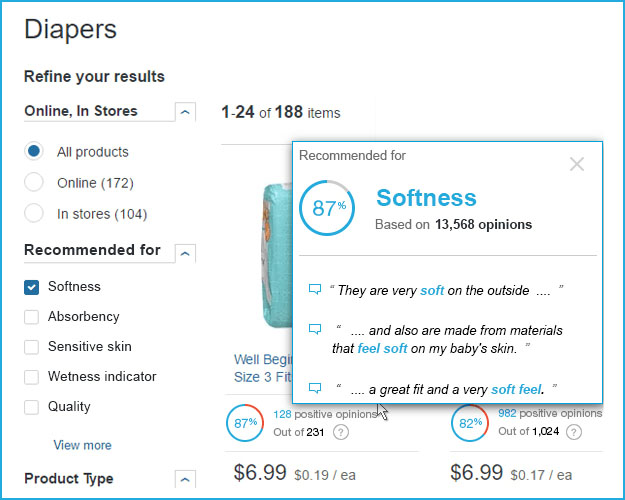
Source: Aspectiva
Will attribute-based product recommendations be a game changer for Walmart?
Walmart last week acquired Aspectiva, an Israeli-based startup that uses natural language processing (NLP) and machine learning to enable online reviews to be sorted by product attributes.
While most online sites rank products on simple one to five-star ratings by consumers, Aspectiva’s platform promises to bring “multi-dimensional” ratings so browsers can focus on the attributes they find most important.
For example, an online review of diapers may show ratings based on attributes such as “softest”, “absorbency”, “sensitive skin”, “wellness indicator” or “overall quality”. A wireless soundbar for a television may show ratings based on factors such as “sound”, “quality”, “bass”, “remote capabilities”, “Bluetooth capabilities” and “overall features”.
On its website, Aspectiva said its technology adds “a new unique data layer to product filtering, enabling shoppers to search and filter products by the attributes they care about most.”
Seeing product ratings by attributes also provides “at-a-glance insights” that saves consumers the time required to read through many customer reviews to find that information.

The attribute ratings are accumulated by Aspectiva’s NLP and machine learning technology that analyzes “massive amounts” of user-generated content and opinions across the internet and “surfaces what people say about any product in any vertical and understands what they feel about each specific product attribute.”
Aspectiva’s NLP algorithms employ deep sentiment analysis to understand, for instance, whether a sentiment is positive or negative in context, such as “low quality” versus “low price.”
With the denser level of ratings, products can be suggested based on the consumer’s intent to add a level of personalization to reviews. At the store level, having attribute-based product recommendations accessible on mobile devices offers shoppers a “knowledgeable in-store assistant” as they shop.
Aspectiva will join Walmart’s Store N° 8 incubation arm. It’s unknown whether it will remain a standalone service or proprietary to Walmart.
A recent review by Street Fight Daily noted that Aspectiva is one of a number of startups, also including Lexalytics, SentiGeek, Revuze and BirdEye, using AI to analyze user reviews.
- Walmart Acquires Israeli Natural Language Processing Startup Aspectiva – Walmart
- Aspectiva
- News & Analysis Street Fight Spotlight – 5 Platforms Using AI to Analyze Customer Reviews – Street Fight Daily
- Walmart acquires product review startup – Retail Dive
- Walmart acquires Israel’s Aspectiva, which analyses UGC to recommend products to shoppers – TechCrunch
Discussion Questions
DISCUSSION QUESTIONS: What do you think of Aspectiva’s technology and the appeal of attribute-based product recommendations? How might Walmart benefit? Will AI take user-generated content and online reviews to another level in the shopper journey?


It’s one giant step closer to providing a personalized experience for the shopper which is all good.
The usefulness of the technology will be determined by the quality of the reviewer input and how accessible the results are made for shoppers. Aspectiva addresses the reviewer input issue by generating the ratings from the natural language reviews already being written. Apps that require reviewers to rate every attribute of a product quickly drive respondents away — no different than any survey that gets too long. So how Walmart makes the output available to shoppers will be the key to how useful it is.
Providing intelligence that can offer more contextualized recommendations should be chalked up under “why hasn’t this happened before now.” It is really amazing to see Walmart acting so smart as they continue to push their business in new directions. Ultimately, this technology should provide an uplift in sales based on the ability to provide recommendations that are more refined and more relevant.
Combining sentiment and attribute analysis with online browsing behavior could anticipate the factors online shoppers care about, saving time and improving relevance. How that works in a physical store is not as clear. Location within the store is inexact. Using purchase history would seem to make the algorithms more accurate.
The benefits don’t just accrue to the shopper, however. Using sentiment analysis for research is another use case that deserves attention. Mining reviews for satisfaction with products and service could also help Walmart with supplier selection and competitor analysis.
Attribute- and data-driven content is a foundational requirement for meeting the shopper expectations of an omnidirectional retailing environment. Whether it is relevant marketing material, product information, pricing, reviews, or recommendations – all this content must be created, curated, and published across all shopper paths to purchase. This functioning ecosystem is the same in order to offer localization and personalization.
This isn’t only about helping customers find what they want to buy, it’s also about competing with Amazon.
Right now, 55 percent of online consumers considering a purchase start their search on Amazon.com. Amazon’s extensive reviews on almost any item make them a great choice for evaluating products. Walmart is making a smart, strategic move to leapfrog Amazon on reviews and get more customers to start their search with Walmart instead of Amazon.
YES! This is definitely keeping the customer at the center and catering to how decisions are made in an increasingly personalized world. Of course the key is getting the attributing correct and allowing an evolution toward multiple intersections to emerge connecting the right product recommendation with the right shopper at the right time.
In the age of information overload, providing customers with a way to view only the most relevant information will certainly provide a better user experience. With many shoppers using online sites to research products before they buy, Walmart is smart to harness technology to make that research easier.
I think that natural language processing and machine learning will represent a cutting-edge improvement in customer engagement and the value of product recommendations. The retail industry is plagued with content that is manufacturer and merchant generated, with little validation from users that the language used has any relevancy whatsoever.
NLP will not only improve the authenticity of language used with consumers, but will provide additional connections between products that can be used in product recommendations as well. And this is only the beginning of true personalization of marketing communications.
Attribute-based product recommendations – brilliant. I’ve been trying to figure out how to articulate this idea for a couple of months and I really hope this remains a standalone service. Kudos to Walmart for continued innovation especially in digitized formats.
Smart retailers and brands have been using attributes in merchandise planning and predictive analysis for years. Providing consumers a way to quickly find relevant products using attributes should radically improve shopping experience and satisfaction.
Anyone using the Star ratings and comments about the product realizes that they must read each review and synthesize what is being said. Attribute-based searches will allow the consumer to make searches and decisions easier by asking questions about the products they cannot do today. Walmart will benefit by providing shoppers a more robust yet quicker way to find products encouraging users to use the Walmart app and purchase from Walmart. AI will provide shoppers a higher level of search and advice since the shopper will be able to frame his/her questions about products in the category in the manner they would find most useful.
I think anything that helps people to navigate the masses of choice online is a good thing. Online shopping is great for a lot of things, but it can get frustrating when you’re trying to make a decision and you’re trawling through reviews to see if the product meets your needs. Being able to say what you’re interested in knowing about the products and seeing how it stacks up based on that criteria is a really useful tool. Will it change the game? We’ll see, but it’s definitely something worth Walmart exploring.
Using filters to simplify and improve the experience for viewing consumer product reviews will be valued feature for consumers. Leveraging this intelligence for attribute-based product recommendations will also provide consumers more targeted product recommendations that match their personal preferences. While this is static today and requires customer voice input, when this is coupled with real time context about the customer like what is in their closet or pantry it will be an incredibly powerful tool. It will unleash the power of analytics, new math aimed at the customer. While most consumers won’t realize that there is science behind the recommendations, they may notice that their product recommendations seem more aligned with what they are looking for. This improves the customer experience and hence loyalty.
Walmart continues to push the envelope and anything they can do to improve product search will help them better compete with the product search leader – Amazon.